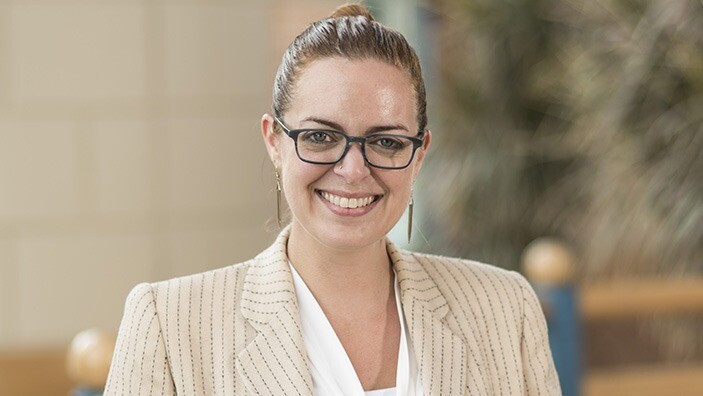2024 marks a record year for elections, with more than 64 countries across the globe taking to the polls – from the UK to the US, Austria to Namibia – and more than 2 billion voters expected to have their say (in addition to the recent European Parliament elections).
A landscape of global uncertainty, driven by geopolitical tensions, economic volatility and ever-evolving advancements in technology, calls for exceptional leadership and resilience. But for those up for the challenge and looking to make their mark in the world, a career in government can be one of the most rewarding out there.
So how can an MBA at Cambridge help prepare students for a career in government and leadership positions more generally? We spoke to MBA alumna Taylor Barden Golden – who worked for the US Senate, before becoming a Senior Consultant at global tech firm Concentrix – and Dr Michael Kitson, Director of the MBA Programme, to find out more.

Taylor Barden Golden
Cambridge MBA class of 2022/23
You worked for the US Senate prior to embarking on the MBA – what was it like to work in government?
At the US Senate I was a director of scheduling, so my job was to compile the daily schedule of my senator and then run the day, making sure they were prepared for every meeting and event. It was extremely cool because it’s a fairly powerful position – you’re constantly with your senator, going to events, and there’s no other job like it. It gave me a real insight into the life of a senator – busy but extremely rewarding. The role was highly strategic, but it could also be chaotic, as schedules often changed last-minute! It’s definitely a 24/7 job.
What made you decide to apply for the Cambridge MBA?
I wanted to learn new skills and further develop my career, and I really wanted the historic Oxbridge experience – I had also done a summer programme in high school at Cambridge, and I really fell in love with it, so I decided during the pandemic that it was the right time, and decided to apply.
What leadership opportunities were available to you on the MBA?
There are so many leadership opportunities. At Cambridge Judge itself, you could run for Business School President, or take a leadership role at the Cambridge Business School Club (CBSC), which organises events for the Business School. You could also take a leadership role within one or more of the Business School’s SIGs (special interest groups focused on specific topics, which cover everything from women in business to entrepreneurship and finance).
There were also lots of opportunities within the wider University, from leading student clubs and societies to getting involved with the MCR (Middle Combination Room) in your college, which is the committee for postgraduate students only. I was the first-year representative of the MCR at my college, Queens’, and I really enjoyed that. It allowed me to fully embrace college life and expand my friends and network beyond Cambridge Judge, and I had some really amazing experiences. These were all great opportunities for anyone wanting to get a feel for what it’s like to lead, whether politically or in the business sphere.
How did the MBA study groups and practical projects provide another chance to develop your leadership skills?
We worked in study groups every term, which provided further opportunities to lead teams if you wanted to. I worked with some really incredible study groups, where we would all take different leadership roles at different times.
As part of the MBA, you also take part in the Cambridge Venture Project (CVP), which involves working in your Michaelmas study group to analyse market opportunities for a local business. We worked with a medical technology company that used AI to predict heart failure, and they wanted us to research remote patient monitoring in the US market. As I’m from the US, I definitely feel like I took a bit of a leadership role in that, so we were able to capitalise on different strengths in the team.
That was one of the best parts of my whole MBA experience, and again, these skills are transferrable to both the governmental and non-governmental space.
Beyond leadership opportunities, what was your favourite thing about the MBA as a whole?
The MBA was invaluable for me, and I couldn’t have got my current role without it! Whether you’re switching from the government space to business or vice versa, it’s an incredible way to develop your skills, expand your network and break into a new space.
But for me the thing that really stood out was the people. We had an exceptional group of incredibly smart, dedicated and driven people from all over the world, which means I have friends everywhere I go now. Everyone was so supportive of each other. Cambridge Judge fosters a real environment of co-operation, and I think that’s one of the things that really sets Cambridge apart – it’s a group of kind, caring people that are going to stay connected long into the future. Whether you’re considering a career in government or the business sector, it’s a powerful, invaluable network to have.
5 ways the Cambridge MBA can equip you for a job in government leadership
Michael Kitson, Director of the MBA programme and Associate Professor in International Macroeconomics, tells us how the Cambridge MBA can help equip students for a job in government leadership specifically.
In an era of global uncertainty and geopolitical tensions, government officials must navigate complex economic challenges and international relations. An MBA offers essential skills and knowledge to navigate these challenges.
Insight from MBA Director Michael Kitson
In an era of global uncertainty and geopolitical tensions, government officials must navigate complex economic challenges and international relations. An MBA offers essential skills and knowledge to navigate these challenges, through a number of ways:
1
Deep understanding of economic principles and market dynamics
An MBA provides a deep understanding of economic principles and market dynamics, crucial for formulating sound economic policies. Government officials with an MBA can better grasp fiscal and monetary policies, trade agreements and economic sanctions.
2
Emphasis on strategic thinking and decision-making
An MBA emphasises strategic thinking and decision-making which helps those in government to analyse data, weigh alternation policy options and foresee long-term consequences. Furthermore, an MBA helps develop communication, negotiation and conflict resolution skills. These are essential for inspiring confidence, building consensus and managing diverse teams and stakeholders in government.
3
A diverse cohort that fosters global perspectives
The Cambridge MBA attracts a diverse cohort, fostering global perspectives. This exposure is invaluable for government professionals engaging with international counterparts, helping them navigate diplomacy and foster cooperation.
4
Encouragement of creative problem-solving and adaptability
Additionally, the Cambridge MBA encourages creative problem-solving and adaptability, educating those who might consider a career in government to embrace change and address emerging threats and opportunities effectively.
5
Developing the skills needed to navigate a complex world
An MBA also helps students develop leadership skills, crisis management skills, innovation capacity, ethical grounding and networking capabilities. Our goal is to help students make informed decisions, foster international cooperation, and lead with confidence and integrity in a complex world.






